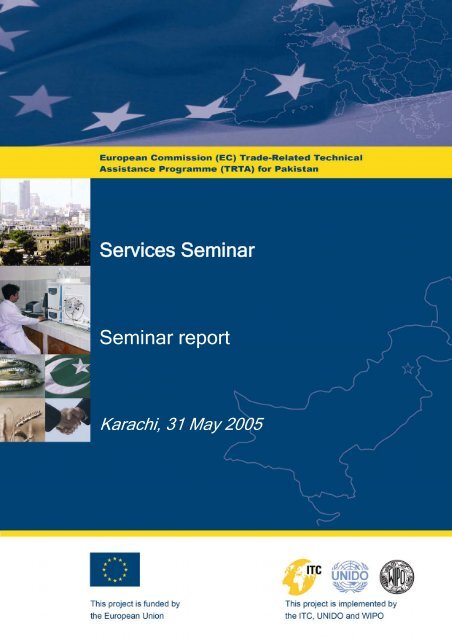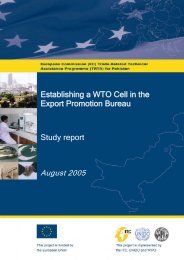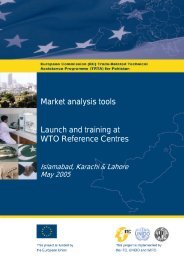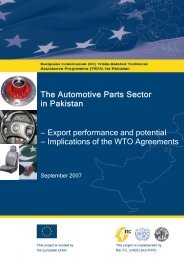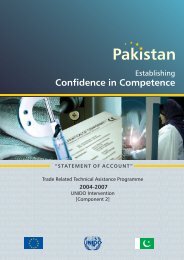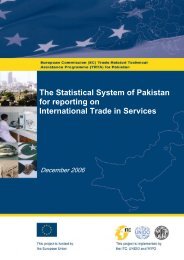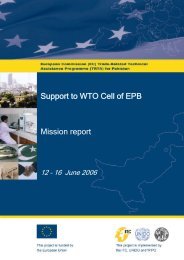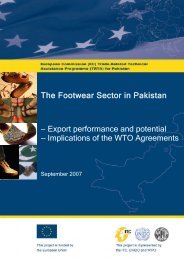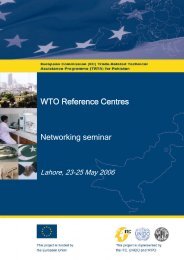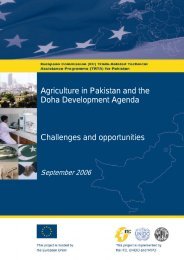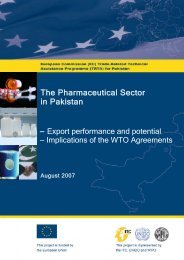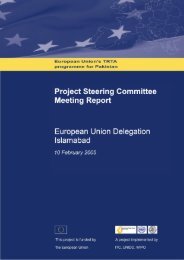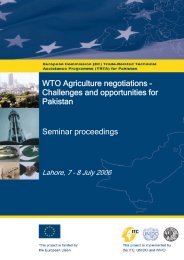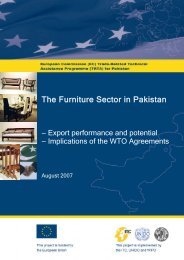Seminar report Services Seminar - TRTA i
Seminar report Services Seminar - TRTA i
Seminar report Services Seminar - TRTA i
Create successful ePaper yourself
Turn your PDF publications into a flip-book with our unique Google optimized e-Paper software.
<strong>Services</strong> <strong>Seminar</strong><br />
<strong>Seminar</strong> <strong>report</strong><br />
Karachi, 31 May 2005
This publication has been produced with the assistance of the European Union (EU) as part of an<br />
EU-funded Trade Related Technical Assistance (<strong>TRTA</strong>) programme with the Government of Pakistan.<br />
The International Trade Centre (ITC) is implementing the programme. The content of this publication is<br />
the sole responsibility of the implementing agency. Facts and figures set forth in this publication are the<br />
responsibility of the implementing agency and should not be considered as reflecting the views or<br />
carrying the endorsement of the EC, ITC, UNCTAD, or WTO. The factual details and in-country<br />
resources in the publication have been researched and compiled by the implementing agency. ITC has<br />
not formally edited this <strong>report</strong>.<br />
Written by:<br />
DPMD/TSS<br />
© International Trade Centre (UNCTAD/WTO)<br />
Palais des Nations, 1211 Geneva 10, Switzerland<br />
Email: itcreg@intracen.org<br />
http://www.intracen.org<br />
Distribution: UNRESTRICTED<br />
May 2005<br />
ITC: Your Partner in Trade Development<br />
The International Trade Centre is the joint technical cooperation agency of the United Nations<br />
Conference on Trade and Development (UNCTAD) and the World Trade Organization (WTO) for<br />
business aspects of trade development. ITC’s mission is to contribute to sustainable development<br />
through technical assistance in export promotion and international business development.<br />
ITC’s strategic objectives are:<br />
Enterprises – Strengthen the international competitiveness of enterprises.<br />
Trade support institutions – Develop the capacity of trade service providers to support<br />
businesses.<br />
Policymakers – Support policymakers in integrating the business sector into the global economy.
Table of contents<br />
Introduction 1<br />
EC <strong>TRTA</strong> Programme 1<br />
<strong>Services</strong> seminar <strong>report</strong> 3<br />
<strong>Services</strong> trade impediments 3<br />
Energy 4<br />
Education 4<br />
Telecommunications: Access to broadband 5<br />
Access to financing 5<br />
Priority service markets 5<br />
Additional issues 5<br />
Follow on 6<br />
<strong>Seminar</strong> agenda 7<br />
Presentation 9<br />
Challenges for business in <strong>Services</strong> negotiations 9<br />
List of participants 13
Introduction<br />
EC <strong>TRTA</strong> Programme<br />
The International Trade Centre UNCTAD/WTO (ITC) is executing an EC-funded Trade<br />
Related Technical Assistance (<strong>TRTA</strong>) programme for Pakistan. The objective of the<br />
programme is to enhance awareness among Government officials, the business sector and civil<br />
society about the implications of World Trade Organisation (WTO) Agreements on the<br />
economy of the country, and to assist Pakistan in building the necessary capacity to address<br />
issues resulting from its participation in the WTO.<br />
Within this framework, a number of series will be held focussing on various aspects of the<br />
WTO negotiating framework – including Agriculture, NAMA and Trade Facilitation in<br />
addition to <strong>Services</strong>.<br />
The seminars involve both public and private sector stakeholders, and are designed to increase<br />
awareness of the negotiations and their progress, to look ahead to the challenges and<br />
opportunities that the negotiations may provide for both government policy and business<br />
practice. This enhanced knowledge will equip business leaders to play a more meaningful<br />
advocacy role with the government, with a view to contributing to the completion of the WTO<br />
negotiations. The seminars are intended to foster communication between business and<br />
government, leading to the formation of negotiating positions in line with national needs and<br />
inclusive of the real and concrete economic and commercial interests of the country.<br />
With the <strong>TRTA</strong>, a number of activities are also focused on the development of Pakistan’s<br />
services exports. These include advisory services and training, a survey of the export potential<br />
of the services sector, and development of a service export strategy. Special events, such as<br />
this, are also being organised targeting trade bodies on how to promote service exports and of<br />
the implications of the GATS.<br />
International Trade Centre Page 1
<strong>Services</strong> seminar <strong>report</strong><br />
The Pakistani Institute of Management (PIM), in conjunction with the International Trade<br />
Centre (ITC), hosted a <strong>Services</strong> <strong>Seminar</strong> on 31 May 2005 in Karachi under the auspices of the<br />
EC Trade Related Technical Assistance Programme (<strong>TRTA</strong>) for Pakistan.<br />
Private sector representatives from the financial, information technology, construction,<br />
telecommunications and professional service sectors were brought together as panellists to<br />
discuss trade constraints. The evening before the seminar, they gathered for a briefing on the<br />
objectives of the seminar and primary principles of international trade in services.<br />
Government agencies were represented by the Ministry of Commerce (MOC), Export<br />
Promotion Bureau (EPB), the Ministry of Industries and Production (MIP), the Pakistan<br />
Software Export Board (PSEB) and provincial governments, and participated actively in the<br />
discussions.<br />
Presentations were made primarily by private sector panellists, and were rich in examples of<br />
General Agreement on Trade in <strong>Services</strong> (GATS) issues as well as general market challenges.<br />
The symposium was characterised by a very transparent exchange of views from both the<br />
private and public sector participants. The Joint Secretary, MOC, Qasim Niaz, participated for<br />
the full day of the event, responding in detail to a number of concerns raised by services<br />
exporters on WTO related issues. This was clearly appreciated by private sector participants.<br />
Moderators for the sessions (both from the private sector) did a good job in keeping panellists<br />
focussed but also in drawing out key themes on services export development. Regulatory<br />
issues, both internal and external, lack of recognition of professional qualifications obtained in<br />
Pakistan and infrastructural inefficiencies were all cited as constraints to services exports<br />
development.<br />
Overall awareness of services exports, both from the private and public sectors remains low in<br />
Pakistan. Although there are some successes, the potential for success in key sectors, such as<br />
financial services, professional services, IT and Telecoms, remains largely untapped. There are<br />
some comparative advantages in the construction sector, but these are being eroded by very<br />
aggressive competition from East Asia and China. The possibilities for attracting outsourcing,<br />
including call centres, service centres and BPOs faces the key challenge of India, which is<br />
many years ahead both in terms of capability and marketing expertise.<br />
The comment from the private sector is they are to a large extent left to their own devices in<br />
the market, whilst at the same time not understanding the overall multilateral services export<br />
environment. The symposium went some way towards redressing these concerns, but it was at<br />
most a positive beginning. Panellist recommendations focussed strongly on the need for a more<br />
sustained public/private sector dialogue.<br />
<strong>Services</strong> trade impediments<br />
Representatives from each sector identified numerous establishment issues in various markets.<br />
For example, a financial institution interested in the Bangladesh, Sri Lanka and Middle East<br />
markets identified complex licensing arrangements, compliance with arduous disclosure rules,<br />
International Trade Centre Page 3
estrictions on repatriation of profits, as well as high capital requirements as constraints to<br />
operations abroad.<br />
A construction conglomerate emphasized their interest in Middle East markets. The firm<br />
identified burdensome registration and licensing procedures, high capital asset requirements,<br />
excessive indemnities, and significant performance guarantees as constraints.<br />
A design firm operating in Lahore, Karachi, Dubai, Manila, and London discussed their joint<br />
venture experience in an unnamed Middle East market. They paid excessive capital<br />
requirements to establish the joint venture. They found the local partner had preferential<br />
standing under domestic law. Once the joint venture became profitable, the local partner<br />
pushed out the Pakistani firm.<br />
An information technology, outsourcing firm explained that "image" was a primary concern.<br />
This resonated with many of the panellists as well as a Pakistani consultant firm interested in<br />
the United Arab Emirates (UAE), Qatar, Saudi Arabia (acceding to the World Trade<br />
Organization (WTO), Malaysia, Zimbabwe, and France. To work around the problem, the<br />
firms sought to establish offices abroad to portray themselves as global entities.<br />
A panellist explained how from an operational standpoint they use all modes of supply from<br />
marketing, service delivery, to after sales service. For example, their associated offices and<br />
offshore business partners outsource design development work to them via cross-border<br />
supply. They serve numerous foreign clients in Pakistan via consumption abroad. Their<br />
representative office in Dubai exemplifies their use of commercial presence. Their staff travel<br />
to find, market, and serve clients abroad via temporary movement.<br />
The firms identified burdensome visa requirements and non-recognition of professional<br />
credentials as constraints to trade. They believed they would gain from efficient, timely<br />
provision of visas in export markets of interest. The firms highlighted recognition of<br />
professional credentials as a necessity for export expansion.<br />
Energy<br />
Reliable access to sources of electricity is a concern of each service firm. Some companies<br />
build generators themselves due to an absence of reliable, quality electricity. This significantly<br />
increases their cost of doing business and makes them less competitive in the international<br />
market. Discussants emphasized this constraint across service and manufacturing firms. 1<br />
As electricity provision is an obstacle to the growth of Pakistani services firms and in light of<br />
current WTO GATS negotiations on energy services, considered exploration of energy<br />
services proposals is warranted from a private-sector perspective.<br />
Education<br />
When service firms higher new staff they have to invest time and money in increasing the skill<br />
level of the new employees. An IT company adopted a rigorous testing process to ensure new<br />
1<br />
A useful source on the issue is "Energy and Environmental <strong>Services</strong>: Negotiating Objectives and<br />
Development Priorities" published by the UN Council for Trade and Development (UNCTAD) published<br />
in 2003 and edited by Simonetta Zarrilli, Economic Affairs Officer, Division on International Trade in<br />
Goods and <strong>Services</strong>, and Commodities, e-mail: HSimonetta.Zarrilli@unctad.orgH.<br />
Page 4<br />
International Trade Centre
hires have the quality of skills needed for their responsibilities. The firm found, for example, in<br />
a pool of 150 applicants, they might only identify 5% that are adequately qualified. It may take<br />
the firm six months to train new hires. This increases the firm's cost of doing business and<br />
represents a drag on their competitiveness.<br />
Telecommunications: Access to broadband<br />
Firms identified the need for greater broadband connectivity domestically and with major<br />
foreign international business centres. A second submarine cable is scheduled to open in<br />
October, however domestic connectivity is still an issue. Given Pakistan's relatively recent<br />
telecommunications liberalization, managing the transition to a competitive telecom market<br />
that ensures adequate broadband build out is a high priority. Careful consideration should be<br />
given to post telecom liberalization issues associated with the efficacy of the independent<br />
regulator in overseeing and disciplining new entrants and the incumbent.<br />
Access to financing<br />
Discussants bemoaned the lack of appropriate financing vehicles for service firms. Discussants<br />
noted the difficulty in sourcing venture-capital funds. Participants highlighted the banking<br />
sector's non-recognition of electronic assets such as databases and user information as a basis<br />
for loans. According to a Pakistani transnational, their growth is constrained because<br />
commercial banks do not accept contracts as a lien or collateral. A firm did point out that they<br />
successfully received loans on the basis of projected cash flows.<br />
An associated anecdote explained how a service firm's purchase of electronic assets from<br />
abroad was not recognized by the public agency overseeing international financial transfers.<br />
Because goods did not change hands, the financial payment for the electronic assets was not<br />
released. Consequently the firm had to create a "dummy" package to move through customs<br />
for the release of the funds.<br />
Priority service markets<br />
Service firms emphasized their interest in Middle East markets, including the UAE, Saudi<br />
Arabia (acceding to the WTO), Qatar, as well as Bangladesh, Sri Lanka, India, China,<br />
Afghanistan, Malaysia, the Philippines, Zimbabwe, the EU, and the US.<br />
Additional issues<br />
Firms emphasized their desire for:<br />
• Ensuring government is a facilitator in services market rather than a competitor in certain<br />
sectors. For example, NADRA Technologies, a public entity, competes with private<br />
technology companies.<br />
• Concerted public-sector effort to build Pakistan's image globally.<br />
• Public sector understanding of the nature of services products and the value of electronic<br />
assets.<br />
• Attention to tax burden and its impact on international competitiveness.<br />
International Trade Centre Page 5
• Recognition of the value of the Information Technology Agreement.<br />
• Ensuring national service standards are consistent with international quality and<br />
certification benchmarks.<br />
• Legislative stability and consistency.<br />
• Reduction of domestic "red tape".<br />
• Coordination on services issues across Ministries.<br />
• Support for consistent participation in International Trade Fairs and Expositions.<br />
• Assistance with marketing skills.<br />
• Targeted training in project management and information technology.<br />
• Understanding and obtaining international certification requirements where applicable.<br />
Follow on<br />
The <strong>Services</strong> <strong>Seminar</strong> effectively identified private sector trade interests. Its success was due to<br />
considerable discussion of trade in services principles with the presenters before the gathering.<br />
Speakers were also advised to simply talk about their business operations in plain terms. The<br />
presence of representatives from the Government helped to create a rich exploration of service<br />
interests.<br />
Page 6<br />
International Trade Centre
<strong>Seminar</strong> agenda<br />
EC Trade Related Technical Assistance Programme For Pakistan<br />
<strong>Services</strong> <strong>Seminar</strong><br />
Pakistan Institute of Management, Karachi<br />
31 May 2005<br />
Opening Remarks<br />
Mr. Arif Ahmed Khan<br />
ITC National Programme Coordinator <strong>TRTA</strong> Programme<br />
ITC Welcoming Remarks<br />
Mr. Bruce Shepherd<br />
ITC Senior Business Advisory <strong>Services</strong> Officer<br />
0900 hrs<br />
0910 hrs<br />
Presentation ‘Challenges for Business in <strong>Services</strong> Negotiations’<br />
Ms. Linda Schmid<br />
ITC Trade in <strong>Services</strong> Officer<br />
Inauguration of Sessions<br />
Mr. Qasim Niaz<br />
JS WTO Ministry of Commerce Government of Pakistan<br />
0950 hrs<br />
Session I<br />
Financial <strong>Services</strong><br />
Introduction by the Moderator<br />
Introduction of the Panelists<br />
Mr. Naved Iqbal, Senior Vice President, Muslim Commercial Bank, Karachi<br />
Mr. Raheel Javed Director, West Minister & Eastern Financial <strong>Services</strong>, Karachi<br />
Mr. Arooj Alam, Ernst & Young International, Karachi<br />
Discussion<br />
Closing Remarks<br />
Session II<br />
IT & Telecom <strong>Services</strong><br />
Introduction by the Moderator<br />
Introduction of the Panelists<br />
Mr. Ahmed Afzal, Director Pakistan Software Export Board, Islamabad<br />
Mr. Atif Mumtaz CEO Cogilient Solutions, Islamabad<br />
Mr. Babar Jhumra, Managing Partner, NBA Computers, Karachi<br />
Discussion<br />
Closing Remarks<br />
1000 hrs<br />
1005 hrs<br />
1010 hrs<br />
1100 hrs<br />
1115 hrs<br />
1120 hrs<br />
1125 hrs<br />
1130 hrs<br />
1220 hrs<br />
1230 hrs<br />
LUNCH BREAK<br />
International Trade Centre Page 7
Session III<br />
Construction & Related <strong>Services</strong><br />
Introduction by the Moderator<br />
Introduction of the Panelists<br />
Mr. Khalil Hassan, Ed.Zublin AG, GBH-Islamabad<br />
Mr. Usman Saleem Khan CEO Impact Design, Islamabad<br />
Mr. Parvez Qureshi Architect, Lahore<br />
Discussion<br />
Closing Remarks<br />
Session IV<br />
1330 hrs<br />
1335 hrs<br />
1345 hrs<br />
1430 hrs<br />
1440 hrs<br />
1440hrs<br />
Professional <strong>Services</strong><br />
Introduction by the Moderator<br />
Introduction of the Panelists<br />
Mr. Yousaf Khosa, Legal Advisor Impregilo SPA, GBH-Islamabad<br />
Ms. Mehnaz Sheraz Partner, Afridi Shah Minallah Law Firm, Lahore<br />
Ms Nousheen Khan, CEO AMZ-KHN Consulting, Islamabad<br />
Discussion<br />
Closing Remarks<br />
1445 hrs<br />
1455 hrs<br />
1545 hrs<br />
1555 hrs<br />
Recommendations from the Panels<br />
1600 hrs<br />
Closing & Tea Break<br />
1630 hrs<br />
Press Conference<br />
1700 hrs<br />
Page 8<br />
International Trade Centre
Presentation<br />
Challenges for business in <strong>Services</strong> negotiations<br />
Business challenges<br />
EC Trade Related Technical Assistance<br />
Programme for Pakistan in <strong>Services</strong><br />
“Challenges for Business in<br />
<strong>Services</strong> Negotiations”<br />
• Awareness of the nature of the services<br />
economy<br />
• Identification of trade in services impediments<br />
• Articulation of interests<br />
• Implementation<br />
May 31, 2005<br />
Karachi, Pakistan<br />
2<br />
Nature of the <strong>Services</strong> economy<br />
Pakistan exports 2003<br />
• Size, scope, growth, employment<br />
• Value of telecom infrastructure<br />
• <strong>Services</strong> relationship to commodity, agriculture,<br />
textile production<br />
• Nature of services impediments<br />
• Transparency in domestic regulation<br />
Manufactures<br />
76%<br />
Other commercial<br />
TransportationTravel<br />
services<br />
6% 1%<br />
4%<br />
Agricultural products<br />
11%<br />
Mining products<br />
2%<br />
Other Commercial <strong>Services</strong>:<br />
Communication<br />
Construction<br />
Ins uranc e<br />
Financial<br />
Computer<br />
Info rma tio n<br />
Other business<br />
Cultural & recreational<br />
Royalties & license fees<br />
3<br />
4<br />
Pakistan trade in services 1999-2003<br />
(Exports)<br />
900<br />
800<br />
Transportation<br />
700<br />
Travel<br />
600<br />
Other commercial services<br />
500<br />
400<br />
Other Commercial <strong>Services</strong>:<br />
Communication<br />
300<br />
Construction<br />
Insurance<br />
200<br />
Financial<br />
Computer<br />
100<br />
Information<br />
Other business<br />
0<br />
Cultural &recreational<br />
1999 2000 2001 2002 2003<br />
Royalties and license fees<br />
Source: WTO Trade <strong>Services</strong> database<br />
5<br />
Telecommunications as the conduit for<br />
international services trade …<br />
• Access to foreign markets<br />
• Means to find, market, and service foreign<br />
customers<br />
• Quality, cost, access determinants of competitive<br />
position<br />
6<br />
International Trade Centre Page 9
<strong>Services</strong> as a significant component of<br />
agricultural, commodity, textile production<br />
• Logistics services critical to bringing products<br />
to market<br />
• Banking and insurance services crucial to<br />
international trade<br />
• Professional services (legal, accounting,<br />
engineering) fundamental to hard & soft<br />
business<br />
7<br />
<strong>Services</strong> trade impediments<br />
• May take the shape of government “measures” or<br />
regulatory barriers at national & sub national level,<br />
i.e. domestic and foreign:<br />
• Law<br />
• Regulations<br />
• Administrative rules<br />
• “GATS establishes rules and disciplines for policies<br />
affecting access to services markets" - Bernard<br />
Hoekman - Assessing the General Agreement on<br />
Trade in <strong>Services</strong><br />
8<br />
Transparency in domestic regulation<br />
• Critical to services markets<br />
Method of creation,<br />
publication,<br />
administration,<br />
adjudication of rules:<br />
• Enables business to<br />
understand the rules governing<br />
commercial practices<br />
• Influences time, quality, and<br />
cost of providing services<br />
• Affects the ability to compete<br />
vis-à-vis domestic and foreign<br />
firms<br />
Grasping the “trade framework”<br />
• Cross-border<br />
• Consumption abroad<br />
• Commercial presence — establishment —<br />
investment regime<br />
• Temporary movement of people<br />
9<br />
10<br />
Identification of trade in services<br />
impediments<br />
• A professional service firm is required to partner with local firms<br />
in foreign markets. They find this impedes their ability to grow.<br />
• Potential Obstacle: prescriptive corporate structure<br />
• Request: ability to establish in form of company’s choice<br />
• A construction firm identifies a prospective project in a foreign<br />
market.<br />
• Potential obstacle: bids not open to foreign enterprises<br />
• Request: non-discriminatory treatment<br />
• Financial institution has identified prospective market niche in<br />
foreign country.<br />
• Potential obstacle: product-specific restriction<br />
• Request: elimination of constraint<br />
11<br />
Establishment rules: bottom line for<br />
business<br />
• Where firms locate<br />
• Who and how many employees they hire<br />
• Which clients they serve<br />
• Their scope and type of service products<br />
• How they access capital<br />
• Cost of doing business<br />
• Competitive position<br />
12<br />
Page 10<br />
International Trade Centre
Identification of trade in services<br />
impediments<br />
• W. K. Chan of the Hong Kong Coalition of Service<br />
Industries founded in 1990 representing 50 services<br />
sectors advised:<br />
“We keep in regular contact with our members, conduct<br />
periodic consultations and occasionally cooperate with<br />
academic institutions on studies to identify their interests...<br />
We also maintain close contact with our constituent members<br />
(industry and professional associations) to gauge their<br />
views."<br />
• Consultation, studies, and collaboration are best<br />
practices to elicit export barriers.<br />
13<br />
Identification of trade in services<br />
impediments – Intra-industry consultation<br />
• Undertaking across service firms and industries is a<br />
delicate process.<br />
• Market players can:<br />
• Examine problems found operating in domestic & foreign<br />
markets<br />
• Explain how problems affect business operations<br />
• Consult to determine if there are common obstacles<br />
• Talk to service users such as agriculture and commodity<br />
producers to find common positions<br />
• Commercially significant impediments that are common<br />
to players generally form the basis of consensus<br />
14<br />
Hearings can help identify trade in<br />
servcies constraints<br />
• Valuable "demand pull" device to drive private<br />
sector input<br />
• Individual firms and services associations<br />
participate<br />
• Facilitates parliamentary or inter-ministerial<br />
consideration of services trade issues<br />
Critical to process<br />
15<br />
Articulation of interests: The written word<br />
• Letters to the editor of local newspapers<br />
• Letters to parliamentarians, trade ministers,<br />
regulators or the chief executive<br />
• Testimony for presentation at trade hearings<br />
• Declarations for release at important trade events<br />
• Brief white papers identifying and explaining the<br />
obstacles and their impact on business<br />
• Firms can act independently or in groups to<br />
articulate their interests<br />
16<br />
Articulation of interests: The spoken word<br />
• Meet one-on-one with public representatives to<br />
introduce and explain issues<br />
• Orchestrate symposiums to discuss services<br />
trade issues and attract press attention<br />
• Participate in radio or television talk shows and<br />
leverage the press<br />
Articulation of interests: The structured<br />
“decision-maker meeting”<br />
• Planning strategy<br />
• Anchor spokespeople to explain interests to<br />
public sector representative<br />
• Consensus on key messages<br />
• Provision of trade issue briefing documents<br />
• Request for specific action<br />
• Follow-up<br />
17<br />
18<br />
International Trade Centre Page 11
Trade agreements: Pakistan & Asia<br />
19<br />
• Economic Co-operation Organization (ECO)<br />
• Pakistan, Iran, Turkey, Afghanistan, Kyrgyzstan, Azerbaijan, Tajikistan,<br />
Turkmenistan and Uzbekistan<br />
• South Asian Association for Regional Cooperation (SAARC)<br />
• Pakistan, Bangladesh, Bhutan, India, Maldives, Nepal and<br />
Sri Lanka<br />
• South Asian Preferential Trade Agreement (SAPTA)<br />
• Pakistan, Bangladesh, Bhutan, India, Maldives, Nepal and<br />
Sri Lanka<br />
• South Asian Free Trade Agreement (SAFTA)<br />
• Pakistan, Bangladesh, Bhutan, India, Maldives, Nepal and<br />
Sri Lanka.<br />
20<br />
“Challenges for Business in <strong>Services</strong><br />
Negotiations”<br />
Implementation<br />
services@intracen.org<br />
21<br />
Page 12<br />
International Trade Centre
List of participants<br />
No. Name Organization Address Phone No. E-mail<br />
1. Ali Raza BMA Capital Karachi 021-2430532 araza@bmacapital.com<br />
2. Nousheen G. Khan AM/KHN Consulting 0300-8549805 nkhan@amzconsulting.com<br />
3. Muhammad Taufiq DHM Enterprises 501, 5 th Floor, Uni<br />
Shopping Centre,<br />
Saddar, Karachi<br />
4. Haroon Mirza Haseeb & Co. 408 Uni Shopping<br />
Centre, Abdullah<br />
Haroon Road,<br />
Saddar, Karachi<br />
5. Farhat Rashid D.I. Sindh 48/11 B6 street,<br />
Phase –V, DHA,<br />
Karachi<br />
5211492/5678545<br />
0300-2485113<br />
5674472<br />
Fax: 5675314<br />
0300-236558<br />
haseebco@super.net.pk<br />
6. Ms. Nudrat Hussain<br />
Khan<br />
7. Muhammad Saqib<br />
Hafeez<br />
EPB<br />
BOI<br />
62, Garden Block,<br />
Garden Town, Lahore<br />
1 ST Floor, Kandawala<br />
Building, M.A. Jinnah<br />
Road, Karachi<br />
8. Asif Khan EPB Shahrah-e-Faisal,<br />
FTC Building, Karachi<br />
9. Athar Khokhar EPB Shahrah-e-Faisal,<br />
FTC Building, Karachi<br />
10. Dr. Masroor Anwar<br />
Memon<br />
EPB<br />
Shahrah-e-Faisal,<br />
FTC Building, Karachi<br />
042-9230640 nudratimran@hotmail.com<br />
021-9215443 saqib_mian@yahoo.com<br />
021-9201520 asif.khan@epb.gov.pk<br />
021-9201520 Atharad2003@yahoo.com<br />
021-9202714 memonmasroor@yahoo.co<br />
m<br />
11. Mansoor Arifeen PAMCO, Punjab Lahore 042-6309721 mansoorarifeen@hotmail.co<br />
m<br />
12. Navaid Iqbal MCB 11 th Floor, MCB<br />
Tower, I.I. Chundrigar<br />
Road, Karachi<br />
13. Arooj Alam Khan Sidat Hyder Morshed<br />
Associates<br />
601, Beaumont Plaza,<br />
Beaumont Road,<br />
Karachi<br />
14. Umar Khalid TMT Ventures Ltd. 610, CTC, Blocks,<br />
Clifton, Karachi<br />
15. M. Jawaid Anwar SME Leasing Ltd. FTC, Shahrah-e-<br />
Faisal, Karachi<br />
16. Qasim M. Niaz Ministry of Commerce Pak Secretariat,<br />
Islamabad<br />
17. Usman S. Khan IMPACT Design No. 4, St-27, F-6/2,<br />
Islamabad<br />
18. Pervez Qureshi Unicon Cons 82, Allaudin Road,<br />
Lahore<br />
19. Jahangir Khan<br />
Sherpao<br />
CITE Architecture<br />
Planning & Design<br />
79 – I&T Centre, G-<br />
8/1, Islamabad<br />
20. S.M. Wasimuddin Jawks Leather D-83, Pakistan<br />
Quarters, Nishter<br />
Road, Karachi<br />
21 Basit Rauf EPB Paris Road,<br />
Sialkot<br />
22. Atif Aziz FTC Building,<br />
Shahrah-e-Faisal,<br />
Karachi<br />
021-2270044 navaid-iqbal@mcb.com.pk<br />
5693521-30 Arooj.khan@sidathyder.com<br />
5863015 umarkhalid@tmtventures.net<br />
9204751-3 Anwar-jawaid@hotmail.com<br />
051-9202107 jswto@yahoo.com<br />
051-2826353 Impact01@comsats.net.pk<br />
042-6688571 uniconconsulting@hotmail.c<br />
om<br />
051-2256997 info@citearchitercture.com<br />
021-2220066 smwasimuddin@yahoo.com<br />
052-9250084 epbskt@brain.net.pk<br />
021-9209202711 atif.aziz@epb.gov.pk<br />
International Trade Centre Page 13
No. Name Organization Address Phone No. E-mail<br />
23. Nasir Hamid FTC Building,<br />
Shahrah-e-Faisal,<br />
Karachi<br />
021-9201517 Nasir.hamid@epb.gov.pk<br />
24. Qamar Anjum Shara-e-Iqbal, Quetta 081-9202491 Qamar127@hotmail.ocm<br />
25. Riaz Ahmed Sheikh FTC Building,<br />
Shahrah-e-Faisal,<br />
Karachi<br />
021-9206808 Riaz.shaikh@epb.gov.pk<br />
26. Syed Zafar Hassan<br />
Zaidi<br />
Int’l. Trading Corp.<br />
27. S. Asim Shah Forms `<br />
4,5 &6 Dilkusha<br />
Chambers<br />
28. Mehnaz Shiraz Afridi, Shah Minallah 15/2, Maratib Ali<br />
Road, Gulber-4,<br />
Lahore<br />
29. Rashid K. Siddiqui Saudi Pak Leasing<br />
Co. Ltd.<br />
30. Mushtaq Ahmed Overseas Pakistani<br />
Foundation<br />
6 th Floor, Lakson<br />
Square Building - 1<br />
Karachi<br />
20/A-II, PECHS<br />
Karachi<br />
31. S.H.A. Bukhari NILAT, M/Labour University Road,<br />
Karachi<br />
32. S. Ghayoor Hassan University Road,<br />
Karachi<br />
33. M. Anwar Khan University Road,<br />
Karachi<br />
34. Khalil Hassan H. 5, St. 3, G-6/3,<br />
Islamabad<br />
35. Ahmed Afzal Evacuee Trust<br />
Complex, F-5,<br />
Islamabad<br />
36. Yusuf Hussain 10, ST.33, F-7//1,<br />
Islamabad<br />
37. Azhar Dahar FTC Building,<br />
Shahrah-e-Faisal,<br />
Karachi<br />
38. Zulfiqar Ali BMA Capital 801, Uni Tower,<br />
Karachi<br />
39. Atif Mumtaz Cogilent 205 D, Evacuee Trust,<br />
Islamabad<br />
40. Babar Jhumra NBA Computer 47-H-I, PECHS,<br />
Karachi<br />
41. M. Itiaz Ahmed Aliya Associate 20/7, Textile Plaza,<br />
Karachi<br />
021-2727349 Itcntn@super.net.pk<br />
042-587300-3 Mehnaz.shiraz@gmail.com<br />
021-5210678 rashidksiddiqui@hotmail.co<br />
m<br />
021-4534868 sindh@opf.ogc.com<br />
021-9243760<br />
021-9243760<br />
021-9243760<br />
0300-8476324 khalilhasan@hotmail.com<br />
111-333-666 aafzal@pseb.org.pk<br />
0300-5001708 Yusuf.hussain@dualmatric.c<br />
om<br />
021-9206809 Azhar.dahar@epb.gov.pk<br />
021-242-6829 zali@bmacapital.com<br />
051-2871173 atifm@cogilent.com<br />
021-4384005 babar@jhumra.com<br />
021-2415563<br />
42. Mubarak Zeb Khan Daily Dawn Zero Point Islamabad 051-2202701-5 mubarakz@hotmail.com<br />
43. Noorul Hadi NILAT University Road,<br />
Karachi<br />
021-9243758<br />
9243764<br />
44. Inaamul Haque Govt. of Punjab P&D Dep’t. Lahore 042-9210491 Inaamulhaq786@yahoo.com<br />
45. FTC Building,<br />
Shahrah-e-Faisal,<br />
Karachi<br />
021-9201505<br />
Page 14<br />
International Trade Centre
Page 16<br />
International Trade Centre


